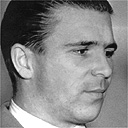Ferenc Puskas 1927-2006
 His death must have come as some relief to his family, given that Ferenc Puskas had spent six years in hospital in Budapest suffering from Alzheimer's disease. As with anyone taken by this cruel illness, their slow and irreversible decline will have robbed his family of many memories of the man in full health. For those of us who knew him from afar - and in my case, distance and years separate me from his full pomp - his legacy should remain brighter than ever.
His death must have come as some relief to his family, given that Ferenc Puskas had spent six years in hospital in Budapest suffering from Alzheimer's disease. As with anyone taken by this cruel illness, their slow and irreversible decline will have robbed his family of many memories of the man in full health. For those of us who knew him from afar - and in my case, distance and years separate me from his full pomp - his legacy should remain brighter than ever. He has long been reeled off in that golden list of names in which those venerable commentators who have decades of perspective on the game of football categorise the greats. Puskas, Di Stefano, Pele, Cruyff, Best, Maradona. Those of us many years too young to have seen him often have to take it as read when told about the qualities of Puskas. We piece together what we hear, splice with clips such as this one, of his four goals in Real Madrid's famous 1960 7-3 European Cup Final win over Eintracht Frankfurt (apologies for the music, presumably an example of black Hungarian humour) and formulate our own, similar reverence anyway.
My father tells of going to watch Hungary beat Scotland 4-2 at Hampden Park in 1954, at a time when the 'Magnificient Magyars' were, despite losing the World Cup final to West Germany a few months previously, regarded as the best team in the world. Predictably, they were astonishing, but one observation my Dad mentions illustrates - where expressions of dog-eared, barely remembered awe might fail - the true progressiveness of that team: he had never seen any football team bend the ball before, until Puskas and his team came to Glasgow that day.
No-one in the eighty or so years of the codified game of football had considered the physics that might be involved to do such a daring thing; to football people of the era, it must have been an extrordinarily exciting idea: the ball does not have to go straight!
Of course Hungary's most famous victory of the time came a year earlier in the 6-3 defeat of England at Wembley, the astonishing effrontery of the Magyars in destroying the inventors of the game on their own patch was a breathtaking demonstration of that team's powers, and a new, great leap forward for the game. Puskas would continue to make those leaps throughout his subsequent career with that great Real team.
That groundbreaking brilliance will live on as long as the game is played.
Labels: football






1 Comments:
As a strange conincidence, I was just beginning to read his autobiography when I found out he had died. Sadly too young to have seen him play but by all accounts, he was a genius. His autobiogrpahy is a facinating read
RIP
Post a Comment
<< Home